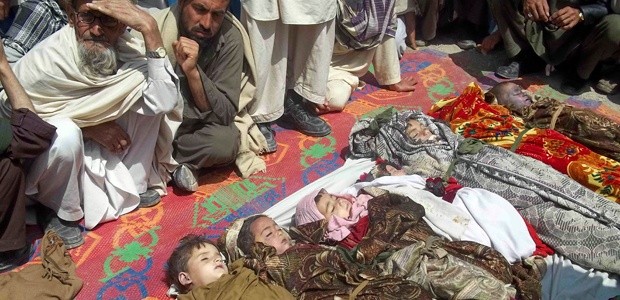

Afghan villagers sit near the bodies of children killed during a U.S.-led NATO airstrike in Kunar province on April 7, 2013.
Using smoke and mirrors in Afghanistan, the Obama administration is seeking to convince the world that there will be “an eventual drawdown” of U.S. and NATO forces. A closer look at U.S. imperialism’s strategic goals of a “pivot to Asia” reveals that the 15-year war’s goals include obtaining an economic foothold in Central Asia. Afghanistan borders Iran, Pakistan, China, and the rich oil and gas resources of the former Soviet republics in Central Asia.


Afghan villagers sit near the bodies of children killed during a U.S.-led NATO airstrike in Kunar province on April 7, 2013.
This geopolitical strategy is consistent with the so-called New Silk Road Policy announced by former Secretary of State Hillary Clinton in 2011 with the object of gaining economic hegemony over Russia, China and Iran. The U.S. occupation of Afghanistan has always been a profit-driven war of economic conquest and plunder.
Since 2001, U.S. foreign policy has aimed at regime change in that region to bring in governments subservient to U.S. interests. By passing the “Authorization for Use of Military Force” resolution soon after the Sept. 11, 2001, events, Congress allowed the president to bypass congressional authorization for declaring war. This facilitated U.S. interventions throughout the region against any government it deemed an obstacle to imperialist interests.
In an interview with USA Today on Dec. 29, Army Gen. John Campbell exposed the truth about the so-called withdrawal from Afghanistan: “My intent would be to keep as much as I could for as long as I could.” Campbell said he was confident the Obama administration would go along with his assessments: “Every time I have gone to the President and said, ‘I need X,’ I have been very, very fortunate that he’s provided that. So he has been very flexible.”
This “flexibility” has cost the working class and the oppressed $1 trillion dollars for 15 years of this unjust and criminal occupation of Afghanistan. Before transferring out of his command, Gen. Campbell testified and told Congress that Afghanistan still needed U.S. support at the same level and would need it for years. The Obama administration reacted by increasing ground troops and drone attacks in Afghanistan.
Human costs of the war
The enormous waste of human lives, especially among Afghan civilians, is the price paid for continuing this war. In October of 2015, Washington announced a reversal of its “exit strategy.” The Pentagon will keep the level of ground troops, excluding “Special Operation Units,” to approximately 10,000. This was also to be accompanied by greater reliance on air strikes by traditional aircraft and the intensification of the use of drones.
The result of the increase in the use of U.S. airpower was demonstrated with the horrific attack last October on the hospital in Kunduz operated by Doctors Without Borders. There, a U.S. AC-130 Flying Gunship killed 42 patients and staff. Doctors Without Borders demanded an independent investigation of this atrocity, which they described as a war crime.
Overall, the number of civilian deaths and casualties has reached a staggering and numbing amount: from 2001, the beginning of the U.S. invasion, to the present, the number of civilians killed has been 26,000 and 29,000 wounded. Overall, the wars of aggression in Iraq, Afghanistan and Pakistan have killed approximately 210,000 civilians, according to the Watson Institute of International and Public Affairs at Brown University, while other sources estimate this number as being much higher, especially with regard to the casualties in Iraq.
U.S. forces have suffered approximately 2,326 deaths and 20,083 maimed and wounded in Afghanistan. Civilian contractors employed by the U.S. have had 1,173 fatalities. Among both Iraq and Afghanistan war veterans there is an average of 22 suicides a day, besides thousands of veterans suffering from post-traumatic stress disorder and substance abuse. (U.S. Department of Veteran Affairs, statistical breakdowns for 2014-2015)
Despite the continuation of a U.S. presence, Washington has been losing out in Afghanistan. Units from both the Afghan army and police forces are defecting to the insurgents and some have been turning their weapons on their officers and on U.S. instructors.
Boston, April 20, 2025 The leadership of the Democratic Party nationally and especially in Massachusetts…
Hamas – Islamic Resistance Movement made the following call, “Gaza cries out to you —…
The centennial of the birth of Malcolm X, also known as El-Hajj Malik El-Shabazz, is…
In a courageous act of solidarity with the Palestinian people, a Moroccan port workers’ union…
Buffalo, New York A large group of demonstrators marched on the Buffalo ICE (U.S. Immigration…
In the 1950s, when Japan and much of Europe was in ruins, the U.S. accounted…